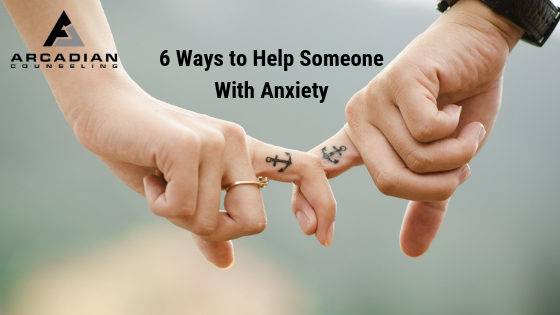For many of us, it can be intimidating or frustrating trying to help a friend or loved one that suffers from anxiety. Panic and anxiety attacks can leave them feeling a variety of symptoms, and you may feel helpless and unable to support them. Here are some tips to help someone you care about who is struggling with anxiety.
Listen Without Judgement
Let them know that you’re there to listen. Hold back judgment or any potentially unwanted advice, and simply be an ear for them. Active listening skills such as repeating what you’re hearing, asking clarifying questions, and using minimal prompts such as, “I see” can be comforting and help keep them talking. It will also help them know that they can speak to you openly, that you care, and that whatever they’re feeling is ok.
Educate Yourself
You can educate yourself about cognitive-behavioral models of anxiety by reading or attending a therapy session with your loved one. Not only will this help you feel more confident and comfortable talking with them, but it demonstrates you truly care about what they’re going through and that you want to understand it and support them.
Typically, people who struggle with anxiety have a natural tendency toward thinking of the worst-case scenarios. You can help them gain perspective when you can use a cognitive therapy technique where you ask them to consider three questions:
- What’s the worst that could happen?
- What’s the best that could happen?
- What’s most realistic or likely?
So, if your loved one is anxious that their friend hasn’t called them back in a while, you can suggest they consider the worst, best, and most likely explanations for the lack of contact.
Be careful not to overly reassure them that their fears won’t come to pass. It’s more helpful to emphasize their coping ability. For example, if they’re worried about having a panic attack in the car, you might say, “That would be extremely unpleasant and scary, but you would deal with it.”
Spend Time
Sometimes simply just spending time together can be very beneficial for a person struggling with anxiety. While we don’t encourage always trying to distract, sometimes it’s the best route. Exercise and outdoor activities are especially helpful. Multiple studies have demonstrated that sunlight and exercise are great mood boosters. If you’re are out having fun, or just talking over coffee, this meaningful distraction helps keep their mind off of their anxiety and on the activity.
Be Patient
If you have never suffered from chronic anxiety, it may be hard empathizing with someone who struggles with anxiety. It may be difficult to comprehend what it means to suffer from anxiety.
Anxiety disorders are not just psychological, there’re also chemical. Many people who struggle with anxiety fully understand that it’s not logical for them to feel anxious about something, but don’t expect them to control their anxiety with that same knowledge. It will take time and a concerted effort on their part.
Be Mindful of Enabling
A core feature of anxiety is avoidance. Sometimes you may feel compelled to “help out” by doing things for your them. It’s ok to help when appropriate, but be careful not to inadvertently feed their avoidance behaviors. For instance, if your anxious partner finds making phone calls incredibly stressful and you end up always doing this for them, they are less likely to push through their avoidance and feel empowered to do it themselves.
Remember, support means helping someone to help themselves, not doing things for them. For example, you might offer to attend a first therapy session with your friend if they set up the appointment. Or, if they’re not sure how to choose a therapist, you might brainstorm with them ways of doing that, but let them choose.
Recognize Accomplishments
Make a point to express pride when you notice improvements. Acknowledgment of positive change after they have put in some hard work will be both beneficial and encouraging to their recovery. You’d be amazed at how valuable a comment such as, “It seems like what you’re doing is really helping” can be for someone battling chronic anxiety.
James Killian, LPC is an anxiety therapist in Woodbridge, CT and the Principal Therapist & Owner at Arcadian Counseling. If you or someone you know is struggling with anxiety and need help managing anxiety symptoms, call today for a free consultation.

